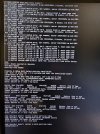Hi all,
I'm pretty new to Proxmox started in January learning about how to use it on older hardware. Decided to buy new components to build a decent server.
Today after one month of use it decided to stop booting. I did apt-get install update and apt-get install upgrade and after a reboot I get the following grub screen:
----------------------------------------------------------------------------
GNU GRUB version 2.06-13+pmx1
Minimal BASH-like line editing is supported. For the first word, TAB lists possible command completions. Anywhere else TAB lists possible device or file competions.
grub>
----------------------------------------------------------------------------
Some information about the "server"
- Proxmox installed on a 1TB SSD
- 9 VMs installed on said SSD
- All backups of VMs available on 4 TB HDD (except for a backup of proxmox of course).
What I tried so far:
- Check bios and see if NVME and HDD are visable, they are.
- Tried to run Proxmox installer from USB drive >> advanced options >> Rescue Boot
This gives me :
Error: failure reaing sector 0xd7326af80 from `hd2'.
Error: failure reaing sector 0xd201000 from `hd2'.
Error: failure reaing sector 0xd200ff0 from `hd2'.
Error: failure reaing sector 0xd200f80 from `hd2'.
Error: prohibited by secure boot policy.
Error: no such device: rpool
Error: unable to find boot disk automatically
I don't know what to do to save my setup, please help.
Kind regards,
ReD1991
I'm pretty new to Proxmox started in January learning about how to use it on older hardware. Decided to buy new components to build a decent server.
Today after one month of use it decided to stop booting. I did apt-get install update and apt-get install upgrade and after a reboot I get the following grub screen:
----------------------------------------------------------------------------
GNU GRUB version 2.06-13+pmx1
Minimal BASH-like line editing is supported. For the first word, TAB lists possible command completions. Anywhere else TAB lists possible device or file competions.
grub>
----------------------------------------------------------------------------
Some information about the "server"
- Proxmox installed on a 1TB SSD
- 9 VMs installed on said SSD
- All backups of VMs available on 4 TB HDD (except for a backup of proxmox of course).
What I tried so far:
- Check bios and see if NVME and HDD are visable, they are.
- Tried to run Proxmox installer from USB drive >> advanced options >> Rescue Boot
This gives me :
Error: failure reaing sector 0xd7326af80 from `hd2'.
Error: failure reaing sector 0xd201000 from `hd2'.
Error: failure reaing sector 0xd200ff0 from `hd2'.
Error: failure reaing sector 0xd200f80 from `hd2'.
Error: prohibited by secure boot policy.
Error: no such device: rpool
Error: unable to find boot disk automatically
I don't know what to do to save my setup, please help.
Kind regards,
ReD1991


